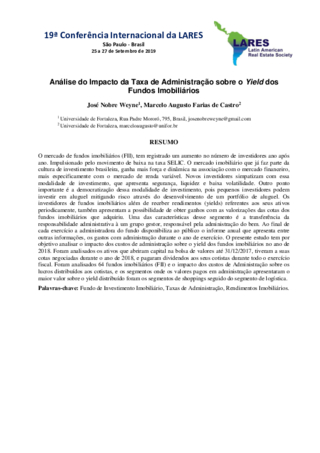O mercado de fundos imobiliários (FII), tem registrado um aumento no número de investidores ano após ano. Impulsionado pelo movimento de baixa na taxa SELIC. O mercado imobiliário que já faz parte da cultura de investimento brasileira, ganha mais força e dinâmica na associação com o mercado financeiro, mais especificamente com o mercado de renda variável. Novos investidores simpatizam com essa modalidade de investimento, que apresenta segurança, liquidez e baixa volatilidade. Outro ponto importante é a democratização dessa modalidade de investimento, pois pequenos investidores podem investir em aluguel mitigando risco através do desenvolvimento de um portfólio de aluguel. Os investidores de fundos imobiliários além de receber rendimentos (yields) referentes aos seus ativos periodicamente, também apresentam a possibilidade de obter ganhos com as valorizações das cotas dos fundos imobiliários que adquiriu. Uma das características desse segmento é a transferência da responsabilidade administrativa à um grupo gestor, responsável pela administração do bem. Ao final de cada exercício a administradora do fundo disponibiliza ao público o informe anual que apresenta entre outras informações, os gastos com administração durante o ano de exercício. O presente estudo tem por objetivo analisar o impacto dos custos de administração sobre o yield dos fundos imobiliários no ano de 2018. Foram analisados os ativos que abriram capital na bolsa de valores até 31/12/2017, tiveram a suas cotas negociadas durante o ano de 2018, e pagaram dividendos aos seus cotistas durante todo o exercício fiscal. Foram analisados 64 fundos imobiliários (FII) e o impacto dos custos de Administração sobre os lucros distribuídos aos cotistas, e os segmentos onde os valores pagos em administração apresentaram o maior valor sobre o yield distribuído foram os segmentos de shoppings seguido do segmento de logística.
The real estate fund market has seen an increase in the number of investors year after year. Driven by low movement in SELIC rate. The real estate market is already part of the Brazilian investment culture, and gains strength and dynamics in the association with the financial market, more specifically with the variable income market. New investors are sympathetic to this type of investment, which presents security, liquidity and low volatility. Another important point is the democratization of this type of investment, since small investors can invest in rent mitigating risk through the development of a rental portfolio. Investors of real estate funds in addition to receiving yields related to their assets from time to time also have the possibility of gaining from the valuations of the real estate funds that they acquired. One of the characteristics of this segment is the transfer of administrative responsibility to a management group responsible for the administration of the asset. At the end of each financial year, the fund manager makes available to the public the annual report that shows, among other information, the expenses with administration during the year of exercise. The objective of this study is to analyze the impact of management costs on the yield of real estate funds in the year 2018. We analyzed the assets that opened the stock market on 12/31/2017, had their quotas traded during the year 2018, and paid dividends to its quotaholders throughout the fiscal year. A total of 64 real estate funds and the impact of management costs on distributed profits to quotaholders were analyzed, and the segments where the amounts paid in management presented the highest value on the distributed yield were the segments of malls followed by the segment of logistics.
